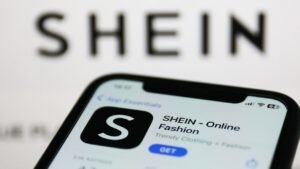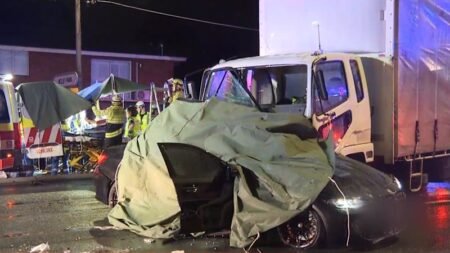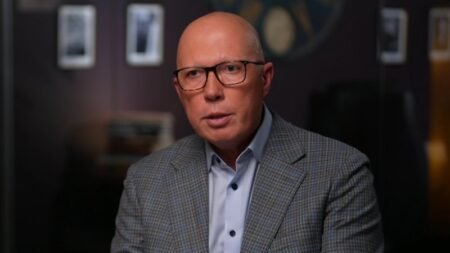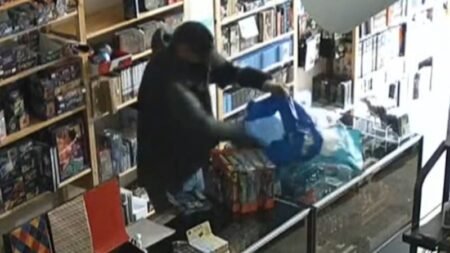And while Hulett’s Labor rival Wilson is also an adept and persuasive performer in front of a camera, Hulett’s frank approach seems to chime with one of her core talking points: transparency.
“The major parties benefit from us not knowing stuff. They want to keep voters in the dark about the political process because it allows them to hang on to power,” Hulett says.
Kate Hulett being filmed for social media at Spearwood bowling club. Credit: Mark Naglazas
“The podcast is an act of radical transparency and honesty that allows voters to understand the process and to become engaged.
“People are telling us they have never connected with anything political until now because we are talking to them in a way they understand.”
Also radical is the involvement of Hulett’s chief of staff, who in other campaigns would be invisible. The long-time friends here are almost a double act, leveraging their natural habits of discussing improving their city and state, and the role creative industries can play.
Hulett, who built her gift shop’s customer base using social media, and Pegrum, a producer who has worked on a wide range of projects, said they approached the election as they would any new business or festival launch.
They say social platforms are how most people get their information now and advertising there is more cost-effective for reaching large numbers on a limited budget, even leaving aside the potential for organic reach.
They also say the flexible formats allow longer, in-depth conversations than mainstream media.
“Everyone we speak to, no matter if it is on social media, while knocking on doors or at community events, appreciates hearing someone actually talk about issues,” says Pegrum.
“They are sick of soundbite announcements.”
While the success of these measures won’t be measured until election day, and pundits agree Hulett will struggle to unseat the popular Wilson in the much larger, more complex Freo federal seat, her numbers are remarkable.

In a more traditional style, Priya and Josh Wilson hand out flyers at Cockburn Central.Credit: Mark Naglazas
Hulett’s clocked 4 million Facebook and Instagram post views recently, and while Curtin teal Kate Chaney has not released numbers, she is also placing socials at the centre of her battle to retain a seat she won in 2022 by the slimmest of margins – 1.3 per cent.
The Chaney reaction: pushing back against traditional media
Chaney, who faces a bruising battle with former Uber executive Tom White to prevent the Liberal Party from snatching back its once-prized seat, says traditional media has been extremely hard on independents and minor parties threatening to seize the balance of power.
“When traditional media plays politics, social media gives us the mic back,” she says.
“In an environment where some media outlets seem to have quite entrenched positions, socials allow us to share the facts and answer directly to the people we represent.”
Chaney, like Hulett, says social media facilitates conversations she can learn from rather than top-down messaging, while “other campaigns are throwing money into big billboards and attack flyers”.
Curtin University journalism senior lecturer Dr Glynn Greensmith agrees there is pushback against independents from major parties and mainstream media.
“[Independents] are responding to the hand they’ve been dealt,” says Greensmith.
“They have been forced to find new ways of speaking to the electorate because the government and the opposition and the major news organisations have diminished their role.

Chaney keeps it real on her socials. Credit: Facebook
“There are more than two parties in this country, but everyone has accepted the reality of Labor and Liberal, which is why we have been watching Anthony Albanese and Peter Dutton debating on their own as if there were no other voices.”
He says a bipartisan approach to squeezing the funding of independents, designed to protect the two-party system, had hampered their visibility.
He also says Australian elections, probably because of compulsory voting, are decided by mostly uninformed and uninterested voters, so any additional visibility can make a difference, but it’s about more than visibility.

Curtin University journalism lecturer Glynn Greensmith.Credit: Mark Naglazas
“Despite the avalanche of rubbish that rains down on us during an election campaign,” Greensmith says, there is a paucity of worthwhile content, so Hulett and Chaney providing in-depth discussion of ideas, and showing more of themselves, can mean valuable traction.
“It feels organic. It hasn’t felt like the targeted, cynical ploy of a political machine,” he says.
“Social media is their medium, but what is essential is their authenticity. They are real people with real ideas who are not afraid to be imperfect.”
Read the full article here
















